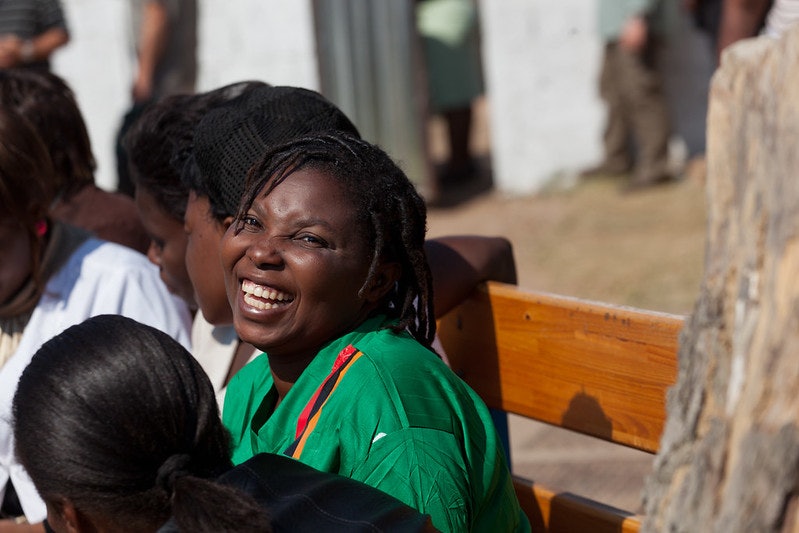Justin Seo, his father, father's friend, and his daughter walked through the Paektu Mountain to find freedom. It's an area not frequently traveled due to wild animals.
To help North Korean escapees pursue higher education and build productive, prosperous lives as new Americans, the Bush Institute awarded eight recipients the North Korea Freedom Scholarship. The scholarship will support escapees pursuing a range of educational opportunities at a variety of post-secondary institutions, including traditional four-year university programs, community colleges, and trade and vocational schools.
Below is the story of recipient Justin Seo. The interview was conducted by Bush Institute Human Freedom Intern Jeff Kim.
How did you escape North Korea?
I escaped with my father, father’s friend, and his daughter. The four of us walked through the Paektu Mountain. I don’t think many people go through this way because there are lots of wild animals. Many people normally pay brokers and cross the border (elsewhere). The route we traveled was actually about five miles or less, normally it would take about 3 hours to walk, but we traveled for three days. We had to be very careful, we had to make sure there were no border patrols and no wild animals. I heard there were tigers and wolves, so we were very cautious. After three days we arrived in China and stayed for six months. Then, we moved near the Russian border into a small city and stayed there for a year and half.
You were born in era better known as the “March of Hardship.” What was your childhood like at that time and did you see any changes in everyday life after the famine?
Resources:
North Korean Escapee Pursues Theology Degree
Escaping North Korea and Finding Freedom
North Korean Escapee Explores the World
Improving the Human Condition in North Korea. Defining a New Path Forward.
Human Rights Still a Missing Piece of the North Korea Puzzle
During the famine there were lots of tragedy going on. Every day I woke up, I heard crying everywhere and it was like this on regular basis. During the famine my parents lost three kids… just so many things happened during the famine. After the famine, I think it stayed the same, but the government treatment got worse. However, the life style got a little better and the view of the society changed. [People stopped relying on the government for basic needs, as the government wasn’t helping, and started supporting themselves.] In a way it was good and bad.
Why did you decide to come to the United States, rather than go to South Korea?
South Korea supported North Korea in the 80’s and 90’s. The South Korean President gave the North Korean dictators money, which lead to the development of nuclear systems. That was the main reason I decided not to go to South Korea.
Were you able to receive education in North Korea? If so, what was your experience like and how does education differ from North Korea and the United States?
I went to school until high school and quit in the middle of high school. We learned little math and Korean, about 90 percent of the lessons were about the dictator. Every story is tweaked, and everything was just made up.
Why is getting an education important to you?
I live in a modern world, I don’t need to use my muscles [manual labor] anymore. So, in order to survive in this society I had to get some education and have some security. That’s the only way to survive and that’s why I go to school.
You are studying information technology – what are your long-term ambitions and goals?
I want to run my own business after school. My real goal is when the North Korean dictatorship collapses, I want to go back to educate and help my neighbors back home.
Are there things that ordinary people can do for the people of North Korea? Are there things you hope to do to improve the situation there?
I think China is the main issue. I recommend anyone who is willing to do it, to write letters to the White House, to the Congress, to the president of China and to the Chinese government to recognize North Koreans as human beings. Second, for people inside North Korea, it’s too early to think about it, but it is my personal goal to help them out when the dictatorship collapses. Priorities would be basic needs, food, medical supplies, and education.
What was the biggest challenge you faced trying to adjust to daily life here in the U.S?
The main issue was the culture issues and second issue was the food. Food is good now, I just had a hard time adjusting to the new food.
What does your daily day-to-day life look like now and what do you do during your leisure time?
Normally, during school break I look for a part-time job, trying to save up as much as I can for when school starts. After work I enjoy watching documentaries based on true stories.
I usually like spending time with friends and I do like to travel but because of the expense I rarely get to. But, I enjoy the time I spend with my friends a lot.
Jeff Kim is a Human Freedom Initiative intern.






























